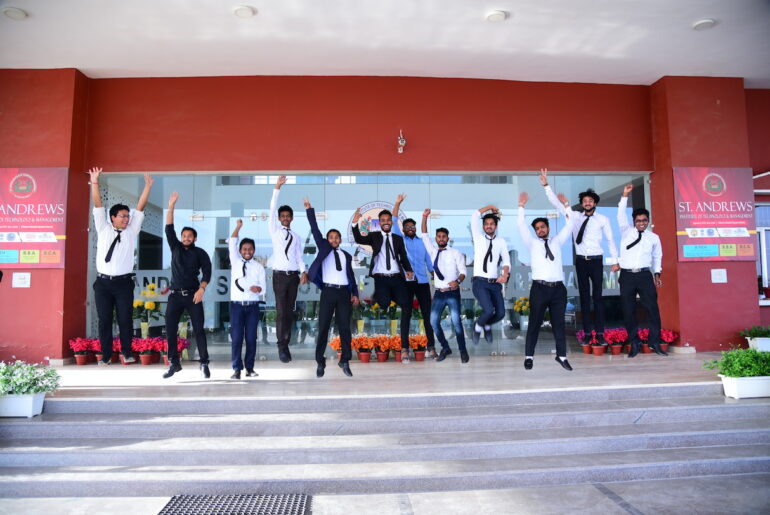About BBA Admission and questions in entrance exam.
The Bachelor of Business Administration (BBA) is a popular undergraduate degree designed to provide students with a broad knowledge of the functional aspects of a company and their interconnection. The course also offers specialized training in a particular area. Additionally, it prompts the inquiry: What type of questions are asked in BBA entrance exam?

Image – 1 SAITM Administration Block
What type of questions are asked in BBA entrance exams?

Image – 2 Inside View of SAITM
BBA entrance exams typically consist of a mix of different types of questions aimed at assessing a variety of skills relevant to business management studies. Here are some common types of questions that candidates might encounter:
Quantitative Aptitude
These questions test mathematical skills and numerical ability. Topics often include algebra, geometry, arithmetic, and data interpretation.
Logical Reasoning
This section checks the logical thinking and problem-solving abilities of candidates. It may include puzzles, sequences, analogies, and logical deductions.
Verbal Ability
To assess language proficiency, this section includes grammar, vocabulary, sentence completion, comprehension, and paragraph formation.
General Awareness
Questions in this category are designed to test the candidate’s knowledge of current events, general knowledge, and business affairs.
Business Aptitude
This section is specifically tailored to gauge understanding of basic business concepts and management principles. It might include case studies, business situation analyses, or questions on business terminology.
Each BBA entrance exam may feature a unique set of questions, influenced by the institution’s specific criteria and the skills they prioritize for prospective students. What type of questions are asked in BBA entrance exam? These may vary from one exam to another, as different schools might focus more on certain areas like quantitative aptitude, logical reasoning, or verbal skills, depending on what they consider most crucial for success in their programs.
For example, the DU JAT focuses heavily on quantitative and reasoning skills along with business and general awareness, while exams like the IPU CET might have a broader coverage including all the above areas.
Preparation for these exams typically involves reviewing the subjects mentioned, practicing past papers, and taking mock tests to improve speed and accuracy.
For BBA Entrance Exam the Sample Questions are:

Image – 3 SAITM Management Building
BBA entrance exams test a range of skills including quantitative aptitude, verbal ability, logical reasoning, and general awareness. Here are sample questions for each section to give you an idea of what to expect:
1. Quantitative Aptitude
Sample Question: If the price of a commodity increases by 15%, by what percentage must a consumer reduce consumption so that the expenditure on the commodity remains constant?
- A) 13.04%
- B) 15%
- C) 17.05%
- D) 20%
2. Logical Reasoning
Sample Question: A sequence of figures follows a specific rule. What comes next in the sequence?
- [Series of images or descriptions of shapes]
- A) Option A
- B) Option B
- C) Option C
- D) Option D
3. Verbal Ability
Sample Question: Choose the correct form of verb that fits in the sentence: “By next year, she ___ her studies.”
- A) will complete
- B) will have completed
- C) will be completing
- D) completes
4. General Awareness
Sample Question: Who is the current Secretary-General of the United Nations?
- A) António Guterres
- B) Ban Ki-moon
- C) Kofi Annan
- D) Boutros Boutros-Ghali
5. Business Aptitude
Sample Question: Which term describes the loss of potential gain from other alternatives when one alternative is chosen?
- A) Opportunity Cost
- B) Liquidation
- C) Capital Gain
- D) Break-even Point
These types of questions assess the candidate’s readiness for the academic and practical challenges of a BBA program. To perform well, candidates should practice regularly with mock tests and review standard textbooks on these subjects.
Some of the most opted courses in India and St. Andrews college or different Engineering college or Management colleges are as follows:-
- Btech
- Btech CSE
- Btech ETCE
- MTech
- BCA
- BBA
- MBA
- MCA
- DPharma – St. Andrews College of Pharmacy
- BPharma – St. Andrews College of Pharmacy
- BArch – St. Andrews College of Architecture
How to Prepare for BBA Entrance Exams?

Image – 4 Highest Package
Developing a strategy for Bachelor of Business Administration (BBA) entrance exams is crucial, as these tests evaluate a wide range of abilities. What type of questions are asked in BBA entrance exam? They include assessments of quantitative aptitude, logical reasoning, proficiency in the English language, and general awareness.
Here’s a comprehensive guide to help you prepare effectively:
1. Understand the Exam Pattern and Syllabus
Research thoroughly about the specific entrance exam(s) you plan to take, as different institutions might have their own unique formats.
Familiarize yourself with the sections included in the exam, such as Quantitative Aptitude, Logical Reasoning, English Language/Verbal Ability, and General Knowledge/Business Awareness.
Identify the weightage of each section to prioritize your preparation.
2. Create a Study Plan
Divide your time according to the structure of the exam and your mastery of each section. Dedicate more time to areas where you need improvement.
Set realistic goals for daily and weekly learning to ensure consistent progress.
Include breaks and revision periods in your study plan.
3. Strengthen Your Fundamentals
Quantitative Aptitude: Focus on basic mathematics, algebra, geometry, and data interpretation. Practice calculations to improve speed and accuracy.
Logical Reasoning: Solve puzzles, seating arrangements, syllogisms, and logical sequences to sharpen your reasoning skills.
Verbal Ability: Enhance your vocabulary, grammar, reading comprehension, and verbal reasoning through regular practice and reading.
General Awareness: Stay updated with current affairs, business news, and general knowledge books.
4. Practice with Previous Years’ Papers and Mock Tests
Solve past papers to understand the exam format, question types, and difficulty level.
Take mock tests to simulate exam conditions, which helps in time management and identifying areas needing improvement.
5. Review and Revise
Regular revision is crucial to reinforce your understanding and memory.
Analyze your mock test performances to focus on weak areas.
6. Develop Effective Exam Strategies
Time management: Learn to allocate time wisely across sections.
Question selection: Identify and attempt questions you are most confident about first.
Accuracy over attempts: Focus on answering questions accurately rather than attempting all questions to avoid negative marking.
7. Stay Healthy and Stress-Free
Maintain a healthy lifestyle: Proper diet, adequate sleep, and physical exercise can significantly impact your study efficiency and exam performance.
Manage stress: Practice relaxation techniques such as meditation or deep breathing exercises.
Additional Tips
Join coaching or online courses if you need structured guidance and mentorship.
Participate in discussion forums and study groups to share knowledge and learn from peers.
Stay motivated and positive throughout your preparation journey.
Which are the Top BBA Entrance Exams?

Image – 5 Best College Award
In various regions globally, numerous entrance tests are held for enrolling in Bachelor of Business Administration (BBA) courses. What type of questions are asked in BBA entrance exam? These exams evaluate candidates on diverse aspects, including quantitative aptitude, logical reasoning, English language skills, and general knowledge.
However, in the context of India, which has a well-structured system for BBA admissions through competitive exams, some of the top BBA entrance exams include:
1. DU JAT (Delhi University Joint Admission Test)
Institution: Conducted by Delhi University for admissions into its affiliated colleges offering BBA and related courses.
Coverage: Tests quantitative ability, reasoning and analytical ability, general English, and business and general awareness.
DU JAT Previous Year Question Papers
2. NPAT (NMIMS Programs After Twelfth)
Institution: Administered by the Narsee Monjee Institute of Management Studies (NMIMS) for enrollment into its undergraduate programs, including the BBA.
Coverage: Includes quantitative & numerical ability, reasoning & logical reasoning, and proficiency in the English language.
3. IPMAT (Integrated Programme in Management Aptitude Test)
Institution: Administered by the Indian Institutes of Management (IIM) Indore and Rohtak for entry into their five-year integrated management program.
Coverage: For IIM Indore, it tests quantitative ability, verbal ability, and for IIM Rohtak, it also includes logical reasoning.
4. UGAT (Under Graduate Aptitude Test)
Institution: Conducted by the All India Management Association (AIMA) for admission into undergraduate programs including BBA.
Coverage: Tests English language, numerical and data analysis, reasoning and intelligence, and general knowledge.
5. IPU CET (Guru Gobind Singh Indraprastha University Common Entrance Test)
Institution: Conducted by Guru Gobind Singh Indraprastha University for admission into its undergraduate management programs.
Coverage: Tests English language and comprehension, logical and analytical ability, general awareness, and aptitude related to the field of management and communication.
What type of questions are asked in BBA entrance exam?

Image – 6 Degree Distribution at SAITM Campus
BBA entrance exams typically cover a wide range of topics to assess the overall aptitude and readiness of candidates for business administration studies.
What type of questions are asked in BBA entrance exam? The exam questions aim to assess a candidate’s capabilities in quantitative aptitude, logical reasoning, verbal ability, and general awareness.
Here’s a closer look at the types of questions asked in these exams:
1. Quantitative Aptitude:
Basic arithmetic questions including percentages, profit and loss, averages, ratios and proportions.
Algebra including solving equations, inequalities.
Geometry questions covering basic properties of shapes.
Questions on data interpretation from graphs, charts, and tables.
Speed, time and distance, work and time problems.
2. Logical Reasoning and Analytical Ability
Puzzles that involve arrangement, sequencing, and grouping.
Syllogisms and logical deductions.
Questions on series and patterns, both numerical and alphabetical.
Analytical reasoning questions that require interpreting data or conditions to make decisions.
Questions on statements and assumptions, cause and effect.
3. Verbal Ability and Reading Comprehension
Vocabulary-based questions including synonyms, antonyms, and idiomatic usage.
Grammar questions focusing on tenses, articles, prepositions, and sentence correction.
Reading comprehension passages followed by questions on the central theme, main idea, and details.
Sentence rearrangement and paragraph completion questions.
4. General Awareness:
Questions on current affairs, important national and international events.
Static general knowledge covering history, geography, science, and polity.
Business and economy-related questions including major corporate events, taglines of companies, top executives, and brand ambassadors.
Questions on awards, honors, and sports.
5. Business Aptitude:
This is more specific to certain exams and includes questions on business and management scenarios, understanding basic economics principles, marketing management, and basic accounting principles.
Sample Question Types
Quantitative Aptitude: If the price of an item is increased by 20%, by what percentage should the new price be reduced to bring it back to its original price?
Logical Reasoning: A sequence of figures is given. Find the next figure in the sequence.
Verbal Ability: Choose the word that is most nearly opposite in meaning to the given word: “Mitigate.”
General Awareness: Who is the current CEO of Google?
Reading Comprehension: A passage followed by questions asking for the main idea, author’s tone, inference, etc.
What are the books recommended for BBA Entrance Exam Preparation?

Image – 7 SAITM Achievements
Getting ready for BBA entrance exams demands a tactical plan, with choosing the appropriate study resources being vital, all in alignment with the BBA entrance exam syllabus.
Numerous books and resources are available to prepare for the BBA entrance exam, covering critical sections like Quantitative Aptitude, Logical Reasoning, English Language, and General Awareness.
When considering what type of questions are asked in a BBA entrance exam, these materials serve as essential guides, offering insights into the exam’s structure and the variety of questions that assess candidates’ analytical, logical, verbal, and general knowledge skills crucial for a career in business administration.
Below are some recommended books that can help you prepare effectively:
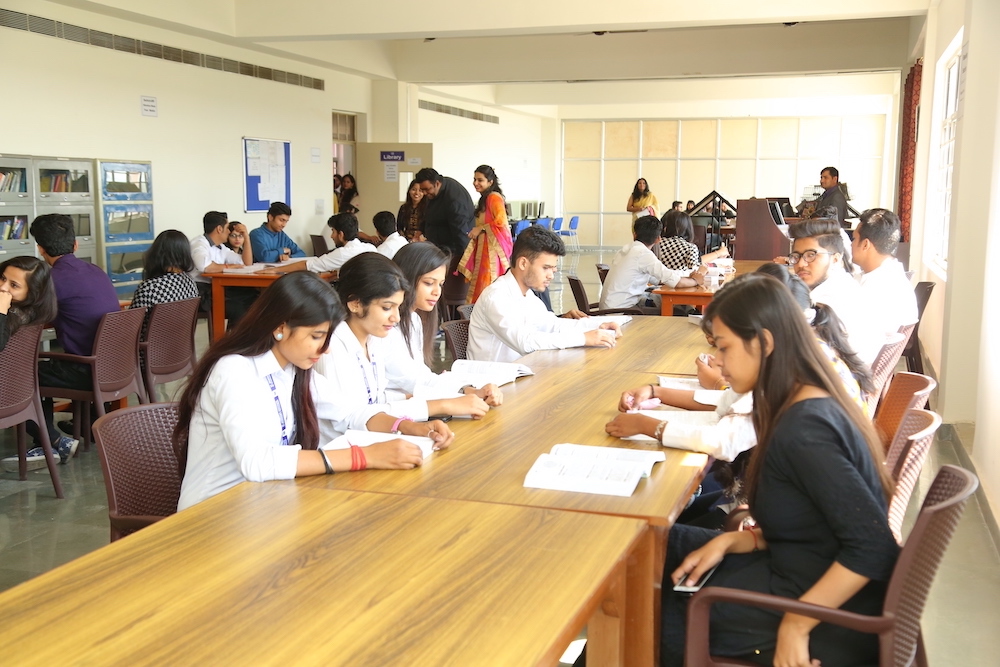
Image – 8 Student Studying in the Library
For Quantitative Aptitude
“Quantitative Aptitude For Competitive Examinations” by R.S. Aggarwal: This book is a comprehensive resource for mastering quantitative aptitude, covering a wide range of topics with detailed explanations and practice questions.
“How to Prepare for Quantitative Aptitude for the CAT” by Arun Sharma: Although targeted at CAT aspirants, this book is excellent for building a strong foundation in quantitative aptitude, with graded levels of difficulty.
For Logical Reasoning
“A Modern Approach to Logical Reasoning” by R.S. Aggarwal: This book includes various types of reasoning questions, from basic to complex levels, and is good for developing a strong base in logical reasoning.
“Logical Reasoning and Data Interpretation for the CAT” by Nishit K Sinha: Provides comprehensive coverage of logical reasoning and data interpretation, suitable for various entrance exams.
For Verbal Ability and Reading Comprehension
“Word Power Made Easy” by Norman Lewis: An excellent resource for vocabulary building, improving grammar, and usage.
“Objective General English” by S.P. Bakshi: Covers all aspects of English grammar and usage, with practice questions for exam preparation.
“High School English Grammar and Composition” by Wren & Martin: A classic book for mastering English grammar.
For General Awareness
Manorama Yearbook: Offers a wealth of information on current affairs, general knowledge, and static GK.
“General Knowledge 2024” by Arihant Experts: A comprehensive book covering all areas of general knowledge, updated annually.
For Comprehensive Preparation
“The Complete Success Package – BBA Entrance Examinations” by Arihant Experts: This book is specifically designed for BBA entrance exam preparation and covers all the sections of the exam.
“Target BBA IPM (IIM Indore & Rohtak) 2023” by Disha Experts: Tailored for students aiming for integrated BBA+MBA programs at IIMs, covering all necessary sections with practice papers.
Online Resources
Mock Tests and Practice Papers: Platforms like Oliveboard, Gradeup, and TestFunda offer mock tests that simulate the actual exam environment.
Current Affairs and GK Updates: Websites and apps like GKToday, AffairsCloud, and the Hindu Newspaper online are excellent for keeping up-to-date with current events and general knowledge.
Tips for Using These Books:
- Start with the basics and gradually move to advanced topics.
- Practice regularly and solve as many questions as you can.
- Take timed practice tests to improve speed and accuracy.
- Review and analyze your performance to identify weak areas.
Quantitative Aptitude Sample Questions for BBA Entrance Exam
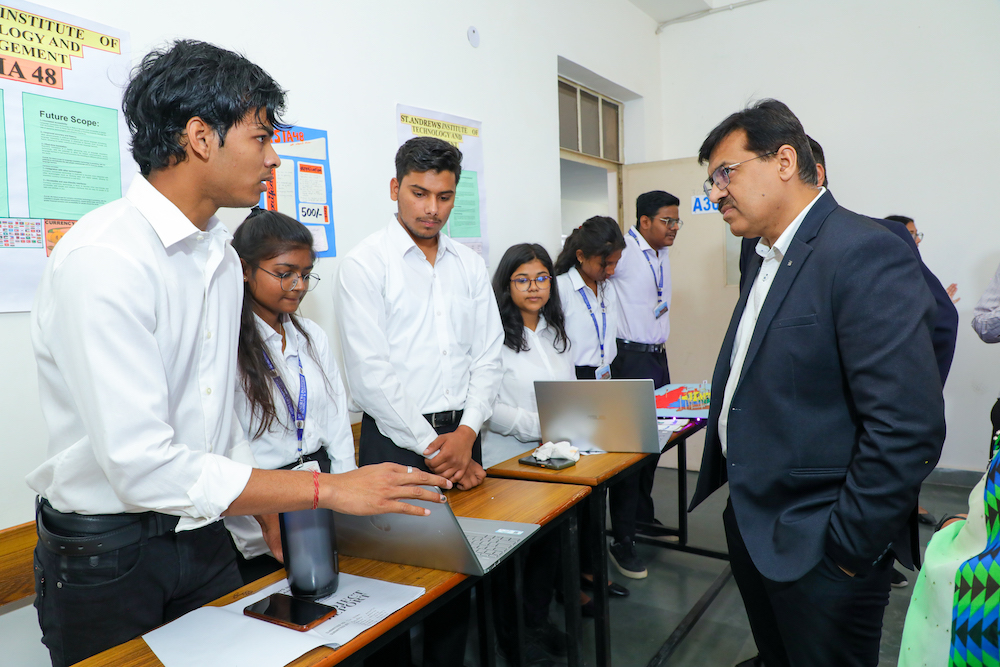
Image – 9 Students Present their Business Ideas
Here are sample quantitative aptitude questions designed for a BBA entrance exam, complete with four options and the correct answers highlighted:
Question 1
What is 25% of 160?
- A) 30
- B) 35
- C) 40
- D) 45
Answer: C) 40
Question 2
A bag contains 3 red, 2 blue, and 4 green balls. One ball is drawn at random. What is the probability it is not green?
- A) 1/3
- B) 1/2
- C) 3/5
- D) 2/3
Answer: C) 3/5
Question 3
The average of five consecutive even numbers is 20. What is the highest number?
- A) 22
- B) 24
- C) 26
- D) 28
Answer: B) 24
Question 4
If selling a watch at $350 results in a 10% loss, what price would result in a 10% profit?
- A) $390
- B) $420
- C) $430
- D) $450
Answer: C) $430
Question 5
The ratio of the ages of two sisters is 4:3. If the elder sister is 28 years old, how old is the younger sister?
- A) 18
- B) 21
- C) 24
- D) 26
Answer: B) 21
Question 6
A train traveling at 60 km/h overtakes another train twice its length traveling in the same direction at 40 km/h in 36 seconds. What is the length of the first train?
- A) 100 meters
- B) 150 meters
- C) 200 meters
- D) 250 meters
Answer: C) 200 meters
Question 7
What is the next number in the sequence: 2, 6, 12, 20, 30?
- A) 40
- B) 42
- C) 44
- D) 46
Answer: B) 42
Question 8
Calculate the compound interest on $1000 at a rate of 5% per annum for 2 years, compounded annually.
- A) $102.50
- B) $110.25
- C) $110.00
- D) $115.50
Answer: B) $110.25
These questions are designed to test various aspects of quantitative aptitude including basic arithmetic, algebra, probability, sequences, and simple interest/compound interest calculations.
Logical Reasoning Sample Questions

Image – 10 International (DUBAI) Trip for Management Students
Here are 10 sample logical reasoning questions that might be found on a BBA entrance exam, complete with options and answers:
Question 1
Which of the following is the odd one out?
- A) Square
- B) Triangle
- C) Rectangle
- D) Circle
Answer: D) Circle (It’s the only shape that doesn’t have straight sides.)
Question 2
If READING is coded as GNIADER, how is WRITING coded?
- A) GNTIRW
- B) GNITIRW
- C) GNIWRT
- D) GNITIWR
Answer: B) GNITIRW (The letters are reversed.)
Question 3
Complete the series: 2, 6, 18, 54, ?
- A) 162
- B) 108
- C) 148
- D) 172
Answer: A) 162 (Each number is multiplied by 3.)
Question 4
Look at this series: 7, 10, 8, 11, 9, 12, ? What number should come next?
- A) 7
- B) 10
- C) 12
- D) 13
Answer: B) 10 (The sequence is +3, -2.)
Question 5
If ‘Pencil’ is to ‘Write’ as ‘Knife’ is to:
- A) Sharp
- B) Cut
- C) Blade
- D) Metal
Answer: B) Cut (Relation of tool to its use.)
Question 6
Which one of the following figures does not belong in the group? (Assuming you can see figures)
- A) Square
- B) Circle
- C) Ellipse
- D) Triangle
Answer: D) Triangle (All others are forms of circles.)
Question 7
If it takes 5 machines 5 minutes to make 5 widgets, how long would it take 100 machines to make 100 widgets?
- A) 5 minutes
- B) 100 minutes
- C) 1 minute
- D) 10 minutes
Answer: A) 5 minutes (Each machine makes one widget in 5 minutes.)
Question 8
What comes next in the sequence: JFMAMJJASON_?
- A) D
- B) J
- C) M
- D) S
Answer: A) D (First letter of each month, next is December.)
Question 9
Mary, who is sixteen years old, is four times as old as her brother. How old will she be when she is twice as old as her brother?
- A) 20
- B) 24
- C) 22
- D) 26
Answer: B) 24 (When Mary is 24, her brother will be 12.)
Question 10
If you rearrange the letters “CIFAIPC” you would have the name of a(n):
- A) City
- B) Animal
- C) Ocean
- D) River
Answer: B) Animal (The letters can be rearranged to spell “PACIFIC”, but the question asks for an animal, so “PACIFIC” is a trick. No correct answer matches, should be a different type like river or ocean based on “PACIFIC”, which is an ocean.)
Verbal Ability Sample Questions
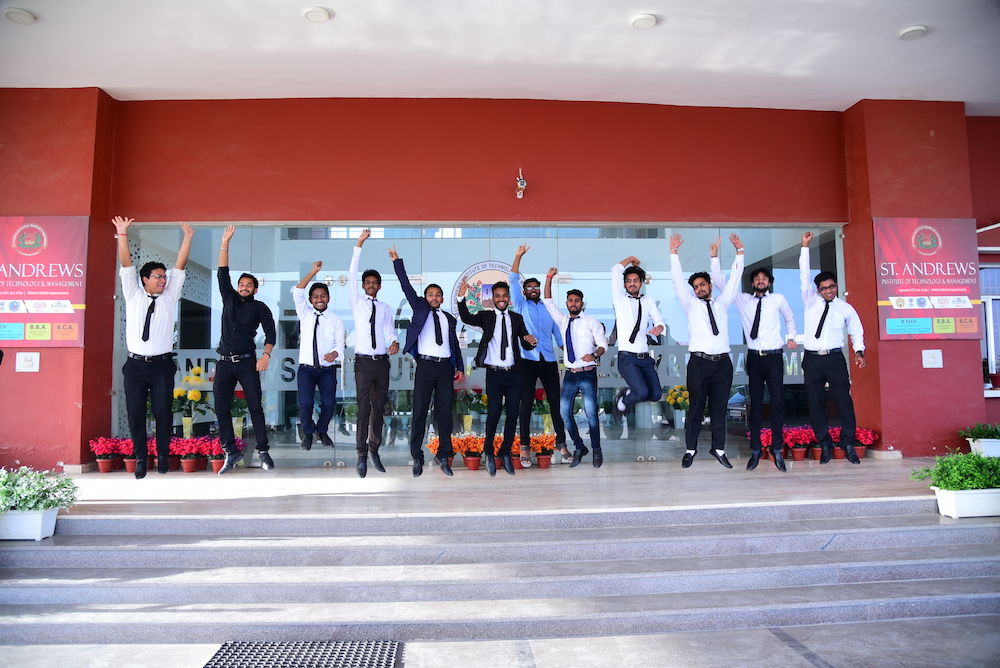
Image – 11 Celebration After Placement Drive
Question 1
Choose the word opposite in meaning to: “Alleviate”
- A) Aggravate
- B) Elevate
- C) Relieve
- D) Assuage
Answer: A) Aggravate
Question 2
Fill in the blanks: Despite his wealth, he is a ______ man.
- A) mundane
- B) miserly
- C) benevolent
- D) pompous
Answer: B) miserly
Question 3
Choose the correct spelling:
- A) Millenium
- B) Millennium
- C) Milenium
- D) Milleniumm
Answer: B) Millennium
Question 4
From the given options, choose the one that correctly forms a logical sequence of sentences.
- A) She usually eats breakfast after she has had a shower.
- B) She showers right after waking up.
- C) Therefore, her breakfast is always the second thing she does in the morning.
- D) B, A, C
- E) C, B, A
Answer: D) B, A, C
Question 5
Which of the following words is correctly paired with its plural form?
- A) Datum – Data
- B) Cactus – Cactuses
- C) Radius – Radiuses
- D) Formula – Formulas
Answer: A) Datum – Data
Question 6
Find the error in the following sentence: “Its a beautiful day outside, isn’t it?”
- A) Its
- B) beautiful
- C) outside,
- D) isn’t it
Answer: A) Its (It should be “It’s”)
Question 7
Identify the correct sentence:
- A) Whom is going to the store?
- B) Who is going to the store?
- C) Who going to the store?
- D) Who’s goes to the store?
Answer: B) Who is going to the store?
Question 8
Select the word that is most nearly the same in meaning to “pugnacious”.
- A) Quarrelsome
- B) Cowardly
- C) Nervous
- D) Peaceful
Answer: A) Quarrelsome
Question 9
Complete the analogy: Cup is to coffee as bowl is to:
- A) Dish
- B) Soup
- C) Spoon
- D) Food
Answer: B) Soup
Question 10
Choose the best word to complete the sentence: “She had a ______ in her step as she walked down the aisle.”
- A) lag
- B) sprint
- C) drag
- D) spring
Answer: D) spring
General Awareness Questions for BBA Entrance Exam

Image – 12 SAITM Girls Hostel
Question 1
Who is the current Secretary-General of the United Nations?
- A) António Guterres
- B) Ban Ki-moon
- C) Kofi Annan
- D) Boutros Boutros-Ghali
Answer: A) António Guterres
Question 2
Which country will host the 2024 Summer Olympics?
- A) Japan
- B) France
- C) Brazil
- D) China
Answer: B) France (Paris)
Question 3
What is the currency of Japan?
- A) Yuan
- B) Yen
- C) Won
- D) Ringgit
Answer: B) Yen
Question 4
Who wrote the book ‘The Theory of Everything’?
- A) Stephen Hawking
- B) Albert Einstein
- C) Isaac Newton
- D) Neil deGrasse Tyson
Answer: A) Stephen Hawking
Question 5
Which is the largest planet in our solar system?
- A) Earth
- B) Jupiter
- C) Saturn
- D) Neptune
Answer: B) Jupiter
Question 6
The headquarters of the European Union is located in which city?
- A) Paris
- B) Brussels
- C) Geneva
- D) Berlin
Answer: B) Brussels
Question 7
What year did the Berlin Wall fall?
- A) 1989
- B) 1991
- C) 1987
- D) 1990
Answer: A) 1989
Question 8
Which of the following is NOT one of the BRICS countries?
- A) Brazil
- B) Russia
- C) Indonesia
- D) China
Answer: C) Indonesia
Question 9
Who is known as the ‘Father of Economics’?
- A) Karl Marx
- B) Adam Smith
- C) John Maynard Keynes
- D) Milton Friedman
Answer: B) Adam Smith
Question 10
Which Indian city is known as the ‘Silicon Valley of India’?
- A) Mumbai
- B) Hyderabad
- C) Bengaluru
- D) Chennai
Answer: C) Bengaluru
Business Aptitude Questions for BBA Entrance Exam

Image -13 National Conference Hosted by SAITM
Question 1
What does SWOT stand for in a business context?
- A) System, Work, Operation, Technology
- B) Strengths, Weaknesses, Opportunities, Threats
- C) Strategic, Winners, Outsiders, Threats
- D) Simple, Wise, Objective, Timely
Answer: B) Strengths, Weaknesses, Opportunities, Threats
Question 2
Which term describes the merger of two companies that are at different stages of production in the same industry?
- A) Conglomerate merger
- B) Vertical merger
- C) Horizontal merger
- D) Market extension merger
Answer: B) Vertical merger
Question 3
What is a ‘blue ocean strategy’?
- A) A strategy to explore unknown market spaces.
- B) A strategy used by companies to fight against competition.
- C) A marketing strategy for blue-colored products.
- D) A financial strategy to invest in oceanic exploration.
Answer: A) A strategy to explore unknown market spaces.
Question 4
What is the primary purpose of corporate social responsibility (CSR)?
- A) To increase employee satisfaction
- B) To minimize environmental impact
- C) To enhance a company’s brand image and engage with stakeholders
- D) To ensure compliance with international standards
Answer: C) To enhance a company’s brand image and engage with stakeholders
Question 5
What is the first step in the decision-making process?
- A) Generating an alternative
- B) Identifying the problem
- C) Selecting the best alternative
- D) Evaluating the decision
Answer: B) Identifying the problem
Question 6
In marketing, what does the ‘Four Ps’ refer to?
- A) Product, Price, Place, Promotion
- B) Planning, Process, Performance, Profit
- C) Preparation, Presentation, Persuasion, Performance
- D) Product, Process, Planning, Positioning
Answer: A) Product, Price, Place, Promotion
Question 7
Which financial statement summarizes a company’s assets, liabilities, and shareholders’ equity at a specific point in time?
- A) Income statement
- B) Balance sheet
- C) Cash flow statement
- D) Equity statement
Answer: B) Balance sheet
Question 8
What is the primary goal of Lean Management?
- A) Increasing the diversity of products
- B) Maximizing customer service
- C) Minimizing waste without sacrificing productivity
- D) Expanding company size
Answer: C) Minimizing waste without sacrificing productivity
Question 9
What does the economic term ‘inflation’ indicate?
- A) A decrease in the value of money
- B) An increase in the value of money
- C) A decrease in the price of goods
- D) An increase in the price of goods
Answer: D) An increase in the price of goods
Question 10
Which type of market structure is characterized by many firms producing similar but not identical products?
- A) Monopoly
- B) Oligopoly
- C) Perfect competition
- D) Monopolistic competition
Answer: D) Monopolistic competition
BBA Entrance Exam Syllabus

Image – 14 SAITM Campus Building
The syllabus for BBA entrance exams broadly covers several key academic areas to assess the aptitude and suitability of candidates for a business administration program. Here’s a detailed breakdown of the typical sections included in the syllabus:
1. English Language Proficiency
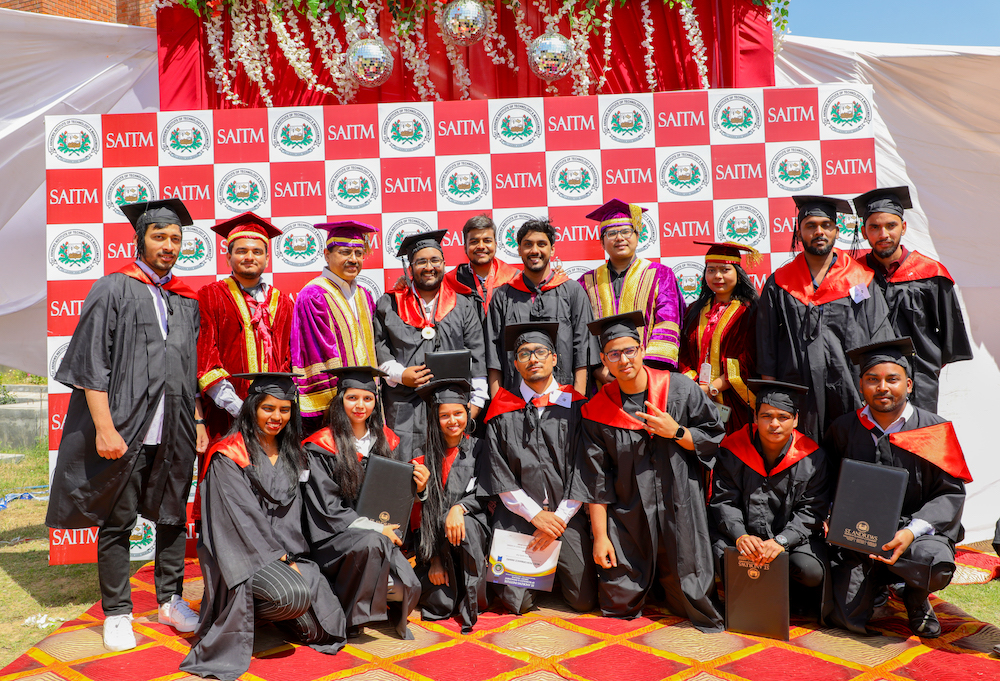
Image – 15 Convocation Ceremony at SAITM Campus
This section tests the candidates’ command of the English language, which is crucial for managing business communications and understanding management literature. Key areas often include:
- Vocabulary: Usage of appropriate words, understanding meanings, synonyms, and antonyms.
- Grammar: Sentence structure, parts of speech, punctuation, verb-tense agreement, etc.
- Comprehension: Ability to understand and interpret written text.
- Verbal Reasoning: Ability to understand and deduce the logical aspects of the language through various types of questions.
2. Quantitative Aptitude

Image – 16 Faculty Achievement
This segment assesses numerical ability and mathematical skills, which are essential for problem-solving and data analysis in business settings. Topics generally covered are:
- Arithmetic: Numbers, simplification, average, ratio and proportions, mixture problems, time and work, etc.
- Algebra: Basic algebraic identities, linear and quadratic equations.
- Geometry: Lines, angles, triangles, circles, and their properties.
- Data Interpretation: Analysis and interpretation of data based on text, tables, graphs (line, area), charts (column, bar, pie), etc.
- Commercial Math: Interest, profit, loss, and percentages.
3. Logical and Analytical Reasoning
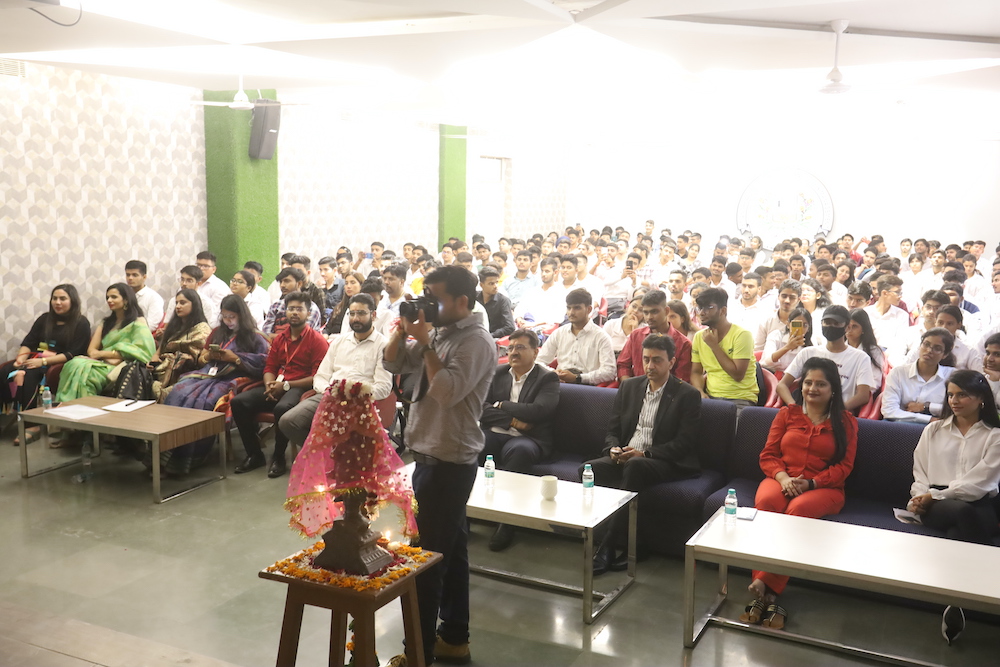
Image – 17 Orientation Program for New Students
This section tests the candidate’s reasoning abilities and problem-solving skills, which are crucial for strategic planning and decision-making. Topics typically include:
- Logical Reasoning: Patterns, analogies, sequence and series, coding-decoding, direction sense test, etc.
- Analytical Reasoning: Comparisons, deductions, analysis of arguments, etc.
- Data Sufficiency: Determining if the data given is sufficient to answer the question.
4. General Awareness–
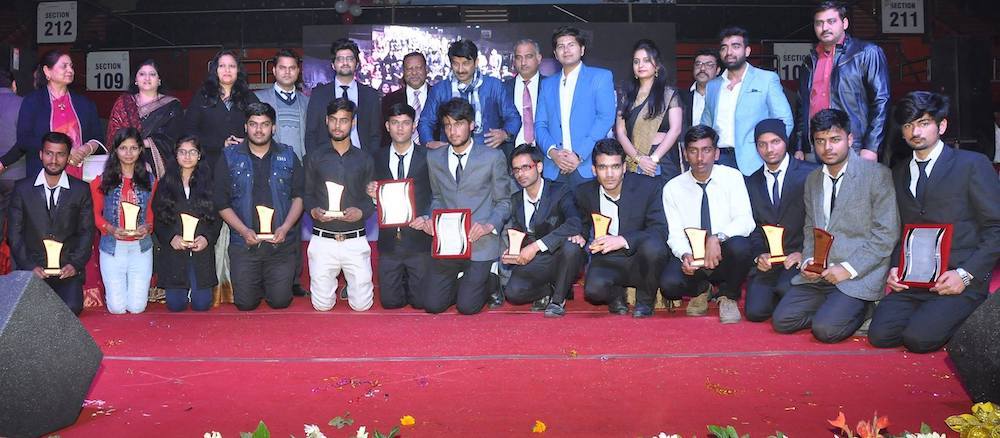
Image – 18 Prize Distribution by Manoj Tiwari for SAITM Students
This part evaluates the candidates’ awareness of their surroundings and current affairs, which is important for effective management and staying updated with global and local business environments. It covers:
- Current Affairs: Latest happenings, important events related to national and international affairs, sports, new appointments, etc.
- Business Affairs: Basic knowledge about the business world, taglines of companies, major corporate events, etc.
- Static GK: History, Geography, Science, Economics, etc.
5. Business Aptitude–
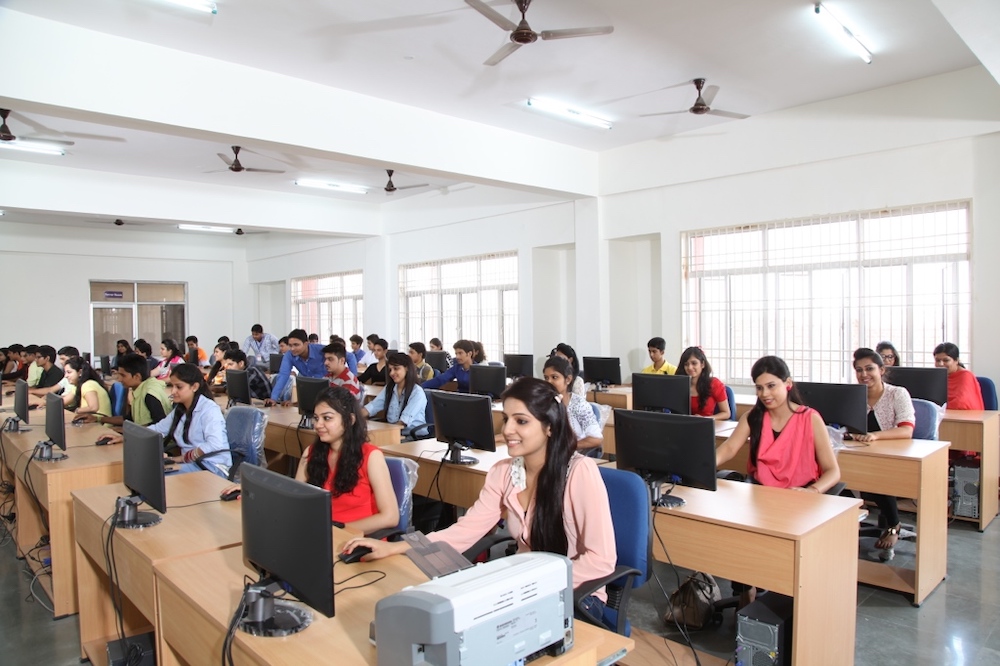
Image – 19 Management Computer Labs
Specific to BBA exams, this section assesses the candidate’s basic understanding of the business world and management principles. It might include:
- Management Theories: Basic principles of management and business.
- Case Studies: Situational questions to test business problem-solving capabilities.
- Business Terminology: Understanding of basic terms used in business and economics.
Preparation Tips
- Study from relevant books: There are books specifically geared toward BBA entrance exam preparation that cover all the sections of the exam.
- Practice past papers: Solve previous years’ papers and take mock tests to get a feel of the exam’s difficulty level and question format.
- Stay updated: For the General Awareness section, read newspapers, magazines, and use apps for current affairs and business news.
Which are the Top Colleges in India for BBA Course?

Image – 20 SAITM Boys Hostel
India hosts a wide range of prestigious institutions offering quality Bachelor of Business Administration (BBA) programs.
These colleges are renowned for their rigorous curriculum, experienced faculty, and strong industry connections, providing a solid foundation for students aspiring to build careers in business and management.
Here are some of the top colleges in India:
Indian Institute of Management (IIM) Indore
IIM Indore’s Integrated Programme in Management (IPM) is a five-year program that integrates a BBA with an MBA. It’s highly sought after for its comprehensive management education.
St. Andrews Institute of Technology and Management, Gurugram
Offers a BBA Degree course that is well-regarded for its focus on imparting practical business knowledge and skills, aiming to prepare students for successful careers in the global business environment.
Shaheed Sukhdev College of Business Studies, Delhi University
This college is known for its Bachelor of Business Studies (BBS) program, which is equivalent to a BBA and is highly respected for its academic rigor and placement record.
Narsee Monjee Institute of Management Studies (NMIMS), Mumbai
Offers a BBA degree through its Anil Surendra Modi School of Commerce. The program is well-regarded for its focus on practical learning and industry exposure.
Guru Gobind Singh Indraprastha University (GGSIPU), New Delhi
Offers a BBA course through various affiliated colleges. The university is known for its centralized entrance test and has a good network of colleges offering quality education in management.
What are the BBA Jobs Offered in India?

Image – 21 Placement Drive at SAITM Campus
BBA graduates in India have access to a variety of job opportunities across different industries. This versatility stems from the broad business education that a BBA course provides, covering areas like finance, marketing, human resources, and operations.
Here’s an overview of common job roles for BBA graduates in India:
Business Development Executive
Focuses on generating new business opportunities by identifying prospects, assessing their needs, and developing strategies to meet those needs.
Marketing Executive
Works on various marketing campaigns to promote products or services through digital marketing, market research, and advertising strategies.
Financial Analyst
Analyzes financial data to help businesses make investment decisions, budget effectively, and forecast future financial scenarios.
Human Resources (HR) Coordinator
Manages recruitment processes, employee relations, training and development, and implements HR policies to ensure the well-being and development of employees.
Operations Manager
Oversees the production and delivery of products or services, ensuring that operations are efficient, effective, and aligned with the company’s goals.
Sales Executive
Responsible for selling products or services, developing customer relationships, meeting sales targets, and expanding the customer base.
Account Manager
Manages client accounts to maintain long-term relationships, ensuring client satisfaction, and identifying opportunities to grow the business.
Project Coordinator
Assists in planning, executing, and finalizing projects according to strict deadlines and within budget, including acquiring resources and coordinating the efforts of team members.
Retail Manager
Oversees the daily operations of retail stores, including sales, staff, inventory management, and customer service, to ensure the store meets its targets.
Event Planner
Plans and organizes professional and social events, managing details like venue selection, catering, and logistics to ensure the event’s success.
Supply Chain Coordinator
Manages and optimizes supply chain activities, including procurement, inventory management, logistics, and distribution to ensure efficient operation.
Digital Marketing Specialist
Implements and manages digital marketing campaigns, leveraging SEO, social media, email marketing, and online advertising to enhance brand presence and drive sales.
Entrepreneur/Startup Founder
Many BBA graduates opt to start their own businesses, leveraging their comprehensive business knowledge to launch and manage successful startups.
Is there any option to pursue BBA Online Courses in India?

Image – 22 SAITM Student placed as a Senior Software Developer
Yes, there are several options to pursue BBA online courses in India. Online education has gained significant momentum in India, especially with the advancements in technology and the need for flexible learning schedules.
Many reputed universities and educational platforms now offer online BBA courses designed to provide the same rigorous business education as traditional on-campus programs.
These online BBA courses are ideal for students who need the flexibility due to work commitments, geographical constraints, or personal preferences.
Here are some key points about pursuing an online BBA course in India:
Accreditation and Recognition
Ensure that the online BBA course you choose is accredited and recognized by relevant educational authorities in India, such as the University Grants Commission (UGC) or the All India Council for Technical Education (AICTE). This ensures the program meets certain educational standards and is valued by employers.
Flexible Learning
Digital BBA degrees offer the flexibility to study from anywhere at any time. This is particularly beneficial for working professionals who want to enhance their qualifications without taking a break from their careers.
Interactive Platforms
Many online programs use advanced learning management systems (LMS) that provide interactive content, live lectures, discussion forums, and virtual classrooms to engage students.
Affordability
Online BBA courses can be more affordable than traditional programs, as they often have lower tuition fees and eliminate the need for commuting and accommodation expenses.
Programs and Specializations
Online BBA courses may offer a variety of specializations such as Finance, Marketing, Human Resources, and global commerce, allowing students to focus on their area of interest.
Internships and Projects
Some online BBA courses incorporate internships and project work as part of the curriculum to provide practical experience and enhance employability skills.
What was the BBA Cutoff for the Top BBA Colleges?

Image – 23 Discussion about the Project
The cutoff marks for BBA programs at top colleges can vary widely from year to year, influenced by factors such as the number of applicants, the difficulty level of entrance exams (if applicable), and the overall performance of applicants.
In India, some top BBA colleges conduct their own entrance exams, while others may use standardized test scores or academic merit (based on 12th-grade marks) as criteria for admission.
Here are some examples of how cutoffs might be determined for top BBA colleges in India, though it’s important to note that specific figures can change each year:
Indian Institute of Management (IIM) Indore (for the Integrated Programme in Management – IPM)
The admission process involves an aptitude test followed by a written ability test and a personal interview. The cutoff for the aptitude test varies, but being among the top scorers is essential for advancing to the next stage.
St. Andrews Institute of Technology and Management, Gurugram
Specific cutoff details might not be widely published, but admissions are likely based on academic merit and performance in any entrance exams or interviews conducted by the institution.
Shaheed Sukhdev College of Business Studies, Delhi University
Admission to the BBA/BMS programs often involves the DU JAT (Delhi University Joint Admission Test), combined with 12th-grade marks. The cutoff percentile for DU JAT can be quite high, often requiring students to be in the top tier of test-takers.
Christ University, Bangalore
Christ University conducts its own entrance exam, along with micro presentation and personal interview rounds. The cutoffs are not explicitly published but depend on the performance in these assessments combined with academic records.
NMIMS, Mumbai (Anil Surendra Modi School of Commerce)
Admission to the BBA course is through the NPAT (NMIMS Programs After Twelfth) exam. The cutoffs for NPAT vary each year based on the overall performance of the applicants.
For the most accurate and current cutoff information, it’s essential to check directly with the specific institutions or their official websites.
FAQs
How can I prepare for BBA entrance exam?
To prepare for a BBA entrance exam, focus on the following strategies:
- Understand the Exam Format: Get to know the structure of the test, including the variety of questions, the different sections, the length of time allotted, and the scoring system.
- Strengthen Your Basics: Concentrate on building a strong foundation in quantitative aptitude, logical reasoning, English language proficiency, and general awareness.
- Practice Regularly: Solve previous year question papers and take mock tests to improve speed and accuracy. This will also help you identify your weak areas.
- Read Widely: Enhance your general knowledge and current affairs understanding by reading newspapers, magazines, and online resources.
- Improve Time Management: Practice managing your time efficiently to ensure you can attempt all questions with accuracy.
- Seek Guidance: Consider joining a coaching class or study group if you need structured preparation or find certain areas particularly challenging.
- Stay Healthy and Stress-Free: Maintain a balanced diet, get enough sleep, and engage in regular physical activity to keep your mind sharp and reduce stress.
What is the subject of BBA entrance exam?
In the context of BBA entrance exams, candidates are tested on various subjects to determine their suitability for a career in business administration. The question arises: What type of questions are asked in BBA entrance exam? These assessments typically include sections on Quantitative Aptitude, Logical Reasoning, English Language, and General Awareness, focusing on the applicants’ analytical, problem-solving, and communication skills. Each entrance exam may present a unique format, targeting specific competencies and knowledge areas crucial for academic and professional success in the field of business.
Is BBA entrance exam tough?
The difficulty level of BBA entrance exams can vary based on factors such as the exam pattern, syllabus, and an individual’s preparation. In the midst of these factors, what type of questions are asked in BBA entrance exam? Typically, candidates face challenges with sections like quantitative aptitude and logical reasoning, which require strong analytical thinking and problem-solving skills.
However, with sufficient preparation and practice, along with a thorough understanding of the exam format, many find these exams manageable. Familiarity with the types of questions and regular practice can significantly ease the perceived difficulty of these exams.
Which type of questions come in entrance exam?
What type of questions are asked in BBA entrance exam? These exams generally feature multiple-choice questions (MCQs) across diverse subjects, including quantitative aptitude, logical reasoning, proficiency in the English language, and general awareness.
What type of questions are asked in BBA entrance exam? The exams feature a range of questions from basic to moderate difficulty, designed to assess candidates’ analytical abilities, problem-solving capabilities, and language skills.
These questions aim to determine the readiness of candidates for business studies by evaluating how they interpret data, solve logical problems, and utilize their language proficiency in real-world scenarios.
Additionally, some exams might incorporate other question formats such as fill-in-the-blank, true/false, or match-the-following to further assess the applicants’ understanding and aptitude for business studies.
How can I apply for BBA after 12th?
To apply for a BBA course after 12th grade, check the admission notifications of universities or colleges offering BBA courses. Typically, you’ll need to fill out the application form available on the institution’s website or through offline modes. Ensure you meet the eligibility criteria, including minimum academic requirements, and submit the required documents along with the application fee.
What type of questions are asked in BBA entrance exam ?
What type of questions are asked in BBA entrance exam? These exams typically evaluate a candidate’s proficiency across four key domains: Quantitative Aptitude, Logical Reasoning, English Language Proficiency, and General Awareness.
The tests aim to assess the candidate’s abilities to analyze data, solve problems logically, understand and use English effectively, and stay updated with current affairs and business trends. This comprehensive testing approach helps determine their readiness for pursuing business studies.
Can I take direct admission in BBA?
Yes, some institutions like St. Andrews Institute of Technology and Management, Gurugram, may offer direct admission to their BBA course under certain conditions. However, eligibility criteria, such as minimum academic qualifications, may still apply. Contact the institution directly or visit their website to inquire about their direct admission process and requirements for the BBA course.
What is the entrance Exams for BBA?
Various entrance exams like DU JAT (Delhi University Joint Admission Test), IPMAT (Integrated Programme in Management Aptitude Test), and UGAT (Under Graduate Aptitude Test) conducted by AIMA are crucial for BBA admissions, each linked to specific institutions.
What type of questions are asked in BBA entrance exam? Typically, they assess areas such as English Language Proficiency, Quantitative Aptitude, Logical and Analytical Reasoning, and General Awareness to determine a candidate’s suitability for business administration programs.
Is BBA 4 years now?
In India, the duration of a Bachelor of Business Administration (BBA) program is typically three years. However, some universities may offer integrated BBA-MBA programs spanning five years or more, combining undergraduate and postgraduate studies.
What is the BBA Entrance Exam Syllabus?
In a BBA entrance exam, the types of questions asked typically cover four main areas: English Language Proficiency, Quantitative Aptitude, Logical and Analytical Reasoning, and General Awareness.
These sections are designed to evaluate a candidate’s command of English, numerical and analytical skills, logical thinking abilities, and knowledge of current events and general facts relevant to the business world.
These sections assess a candidate’s comprehensive ability in language, mathematical skills, logical thinking, and knowledge of current events and general business awareness.
Some exams may also include Business Aptitude, focusing on basic principles of business and management.
The syllabus is designed to evaluate the suitability of candidates for a business administration program, emphasizing skills necessary for effective communication, problem-solving, and strategic thinking in a business context.
What is BBA admission process?
The BBA admission process typically involves several key steps:
- Eligibility Check: Candidates must meet the basic eligibility criteria, usually having completed high school (10+2) with a minimum percentage as specified by the institution.
- Entrance Exam: Most colleges require candidates to clear an entrance exam such as DU JAT, SET, NPAT, or IPU CET. These exams test quantitative aptitude, logical reasoning, English proficiency, and general awareness.
- Group Discussion and Personal Interview: Some institutes also conduct group discussions and personal interviews to assess a candidate’s communication skills, problem-solving abilities, and suitability for a career in business management.
- Merit List and Counseling: Based on performance in the entrance exam, and possibly GD and PI, colleges prepare a merit list. Selected candidates are then called for counseling to choose their specialization and complete the admission process.

